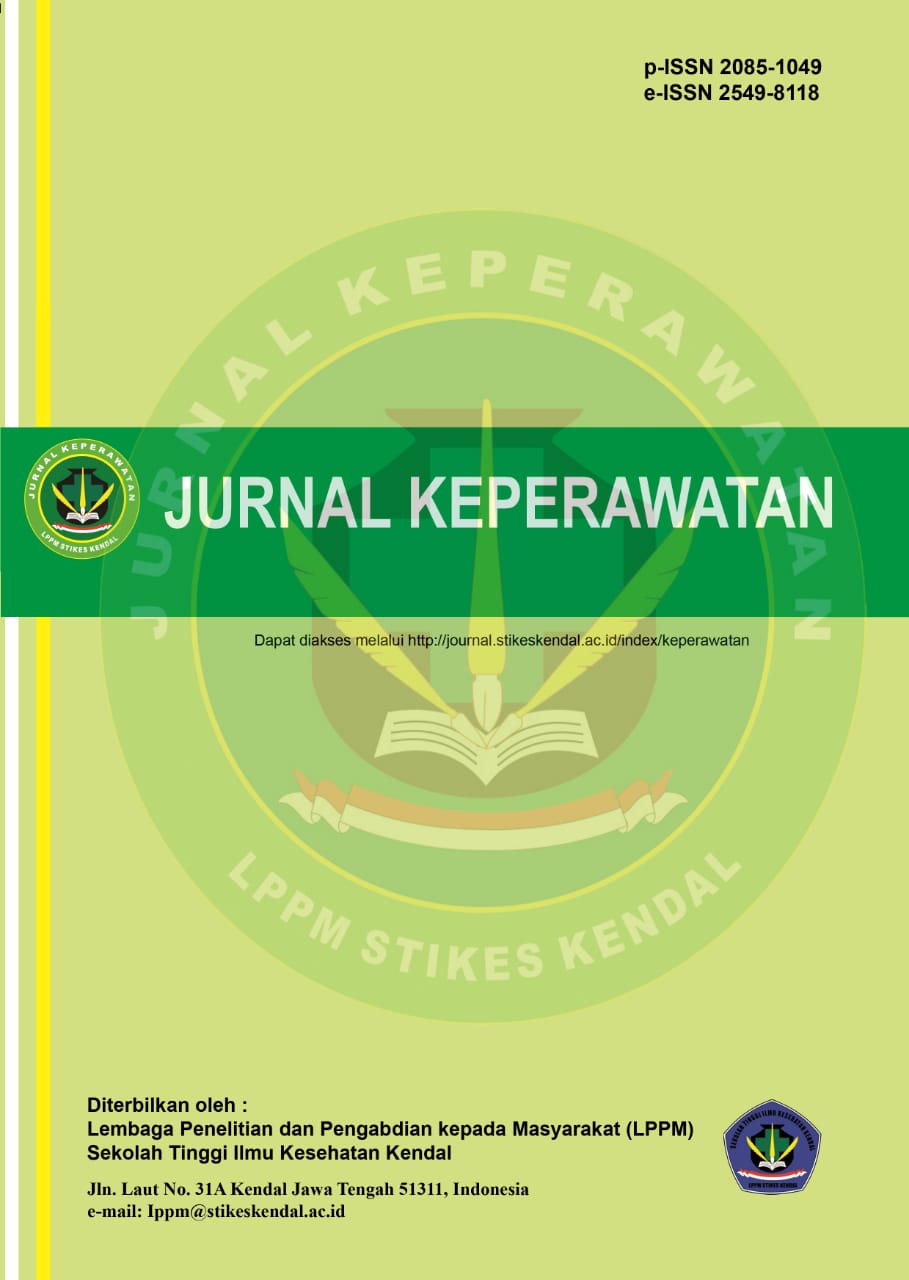Peningkatan Asuhan Terintegrasi melalui Peran Perawat Penanggung Jawab Asuhan
Keywords:
asuhan terintegrasi, peran perawat, perawat penanggung jawab asuhan (PPJA)Abstract
Rumah Sakit mempunyai tanggung jawab memberikan pelayanan dan asuhan terintegrasi yang aman. Asuhan terintegrasi sebagai upaya untuk meningkatkan kebutuhan holistik klien dengan pendekatan preventif, promotif, kuratif dan rehabilitatif. Asuhan terintegrasi yang diberikan memerlukan professional perawat penanggung jawab asuhan (PPJA) sesuai dengan kompetensi, kewenangan, pengalaman, pengalaman dan kebijakan rumah sakit. Oleh karena itu diperlukan strategi penerapan peran interpersonal yang efektik sebagai kunci untuk meningkatkan layanan asuhan terintegrasi. Metode penelitian menggunakan teknik quasi eksperimen pre dan post test nonequivalent with control group. Sampel yang digunakan sebanyak 40 berkas rekam medis asuhan terintegrasi yang dikelola oleh PPJA di rumah sakit negeri dan swasta yang terakreditasi di Singkawang. PPJA dibekali pendampingan terkait dengan peran interpersonal model Peplau, kompetensi perawat manajerial, asuhan terintegrasi sesuai dengan standar komisi akreditasi rumah sakit (KARS) dalam bentuk active learning dan role play. Data dianalisis menggunakan uji-t yang dipasangkan. Penelitian menunjukkan peningkatan asuhan terintegrasi secara bermakna melalui penguatan peran PPJA (p=0.002). Pada kelompok kontrol tidak terjadi kemaknaan dengan p=0,076.
References
Darawad, M. W., & Al-Hussami, M. (2013). Jordanian nursing students’ knowledge of, attitudes towards, and compliance with infection control precautions. Nurse Education Today, 33(6), 580–583. https://doi.org/10.1016/j.nedt.2012.06.009
Djojo, A., Suhariyanto, S., Kapadia, R., Octary, T., Junaidi, J., Sari, D. C., Fitriadi, K., Merry, M., Lestari, A., Nilaprapti, E., Rosyada, I., Yudi, Y., Novita, I., Nandang, I., Rachmadi, A., Hariyati, T. S., & Handiyani, H. (2021). Addie Model-Based Learning To Improve Competences Of Clinical Nurse Leaders. Jurnal Aisyah : Jurnal Ilmu Kesehatan, 6, 133–138. https://doi.org/10.30604/jika.v6is1.774
Hafsah, T., Prawitasari, T., & Djais, J. T. B. (2019). Malnutrisi rumah sakit dan asuhan nutrisi pediatrik di Rumah Sakit Hasan Sadikin Bandung. Jurnal Gizi Klinik Indonesia, 16(2), 47. https://doi.org/10.22146/ijcn.43090
Holley, S. L. (2016). Ongoing Professional Performance Evaluation: Advanced Practice Registered Nurse Practice Competency Assessment. Journal for Nurse Practitioners, 12(2), 67–74. https://doi.org/10.1016/j.nurpra.2015.08.037
Huang, Y., Zhu, P., Chen, L., Wang, X., & Valentijn, P. (2020). Validation of the care providers version of the Rainbow Model of Integrated Care-measurement tool in Chinese primary care systems. BMC Health Services Research, 20(1), 1–11. https://doi.org/10.1186/s12913-020-05562-2
Jeong, S. Y., & Kim, K. M. (2016). Influencing factors on hand hygiene behavior of nursing students based on theory of planned behavior: A descriptive survey study. Nurse Education Today, 36, 159–164. https://doi.org/10.1016/j.nedt.2015.09.014
Liao, J. Y., Chen, P. J., Wu, Y. L., Cheng, C. H., Yu, S. J., Huang, C. H., Li, C. M., Wang, Y. W., Zhang, K. P., Liu, I. Te, Umegaki, H., Hamano, J., Mori, M., Petersen, I., Sampson, E. L., & Hsiung, C. A. (2020). HOme-based Longitudinal Investigation of the multidiSciplinary Team Integrated Care (HOLISTIC): protocol of a prospective nationwide cohort study. BMC Geriatrics, 20(1), 1–8. https://doi.org/10.1186/s12877-020-01920-1
Martin, B., Jones, J., Miller, M., & Johnson-Koenke, R. (2020). Health Care Professionals’ Perceptions of Pay-for-Performance in Practice: A Qualitative Metasynthesis. Inquiry (United States), 57. https://doi.org/10.1177/0046958020917491
Muhsinin, & Deswita. (2012). Asuhan Keperawatan pada Anak dengan Gangguan Nutrisi Akibat Kanker melalui Pendekatan Model. Ners Jurnal Keperawatan, 8, 56–64.
Qian, Y., Hou, Z., Wang, W., Zhang, D., & Yan, F. (2017). Integrated care reform in urban China: A qualitative study on design, supporting environment and implementation. International Journal for Equity in Health, 16(1), 1–13. https://doi.org/10.1186/s12939-017-0686-8
Sutoto, Atmodjo, D., Luwiharsih, Lumenta, N. A., Reksoprodjo, M., Martoatmodjo, K., Amatyah, M., & Saleh, J. T. (2012). Instrumen Akreditasi Rumah Sakit Standar Akreditasi Versi 2012 (Accreditation Instrument Hospital Accreditation Standard Version 2012). In KARS (Vol. 1). KARS.
Darawad, M. W., & Al-Hussami, M. (2013). Jordanian nursing students’ knowledge of, attitudes towards, and compliance with infection control precautions. Nurse Education Today, 33(6), 580–583. https://doi.org/10.1016/j.nedt.2012.06.009
Djojo, A., Suhariyanto, S., Kapadia, R., Octary, T., Junaidi, J., Sari, D. C., Fitriadi, K., Merry, M., Lestari, A., Nilaprapti, E., Rosyada, I., Yudi, Y., Novita, I., Nandang, I., Rachmadi, A., Hariyati, T. S., & Handiyani, H. (2021). Addie Model-Based Learning To Improve Competences Of Clinical Nurse Leaders. Jurnal Aisyah : Jurnal Ilmu Kesehatan, 6, 133–138. https://doi.org/10.30604/jika.v6is1.774
Hafsah, T., Prawitasari, T., & Djais, J. T. B. (2019). Malnutrisi rumah sakit dan asuhan nutrisi pediatrik di Rumah Sakit Hasan Sadikin Bandung. Jurnal Gizi Klinik Indonesia, 16(2), 47. https://doi.org/10.22146/ijcn.43090
Holley, S. L. (2016). Ongoing Professional Performance Evaluation: Advanced Practice Registered Nurse Practice Competency Assessment. Journal for Nurse Practitioners, 12(2), 67–74. https://doi.org/10.1016/j.nurpra.2015.08.037
Huang, Y., Zhu, P., Chen, L., Wang, X., & Valentijn, P. (2020). Validation of the care providers version of the Rainbow Model of Integrated Care-measurement tool in Chinese primary care systems. BMC Health Services Research, 20(1), 1–11. https://doi.org/10.1186/s12913-020-05562-2
Jeong, S. Y., & Kim, K. M. (2016). Influencing factors on hand hygiene behavior of nursing students based on theory of planned behavior: A descriptive survey study. Nurse Education Today, 36, 159–164. https://doi.org/10.1016/j.nedt.2015.09.014
Liao, J. Y., Chen, P. J., Wu, Y. L., Cheng, C. H., Yu, S. J., Huang, C. H., Li, C. M., Wang, Y. W., Zhang, K. P., Liu, I. Te, Umegaki, H., Hamano, J., Mori, M., Petersen, I., Sampson, E. L., & Hsiung, C. A. (2020). HOme-based Longitudinal Investigation of the multidiSciplinary Team Integrated Care (HOLISTIC): protocol of a prospective nationwide cohort study. BMC Geriatrics, 20(1), 1–8. https://doi.org/10.1186/s12877-020-01920-1
Martin, B., Jones, J., Miller, M., & Johnson-Koenke, R. (2020). Health Care Professionals’ Perceptions of Pay-for-Performance in Practice: A Qualitative Metasynthesis. Inquiry (United States), 57. https://doi.org/10.1177/0046958020917491
Muhsinin, & Deswita. (2012). Asuhan Keperawatan pada Anak dengan Gangguan Nutrisi Akibat Kanker melalui Pendekatan Model. Ners Jurnal Keperawatan, 8, 56–64.
Qian, Y., Hou, Z., Wang, W., Zhang, D., & Yan, F. (2017). Integrated care reform in urban China: A qualitative study on design, supporting environment and implementation. International Journal for Equity in Health, 16(1), 1–13. https://doi.org/10.1186/s12939-017-0686-8
Sutoto, Atmodjo, D., Luwiharsih, Lumenta, N. A., Reksoprodjo, M., Martoatmodjo, K., Amatyah, M., & Saleh, J. T. (2012). Instrumen Akreditasi Rumah Sakit Standar Akreditasi Versi 2012 (Accreditation Instrument Hospital Accreditation Standard Version 2012). In KARS (Vol. 1). KARS.
Downloads
Published
How to Cite
Issue
Section
License
Copyright (c) 2022 Jurnal Keperawatan

This work is licensed under a Creative Commons Attribution-NonCommercial-NoDerivatives 4.0 International License.



